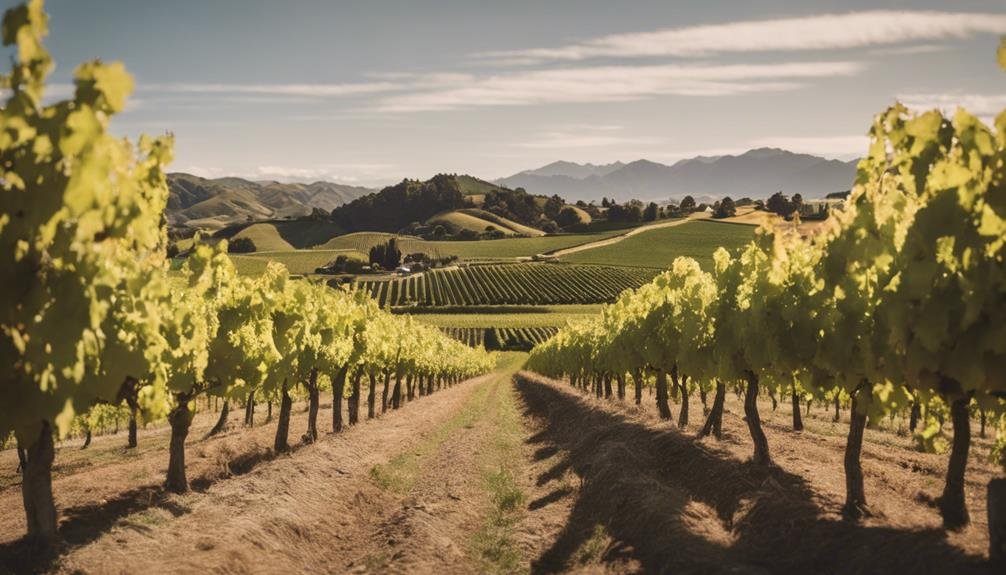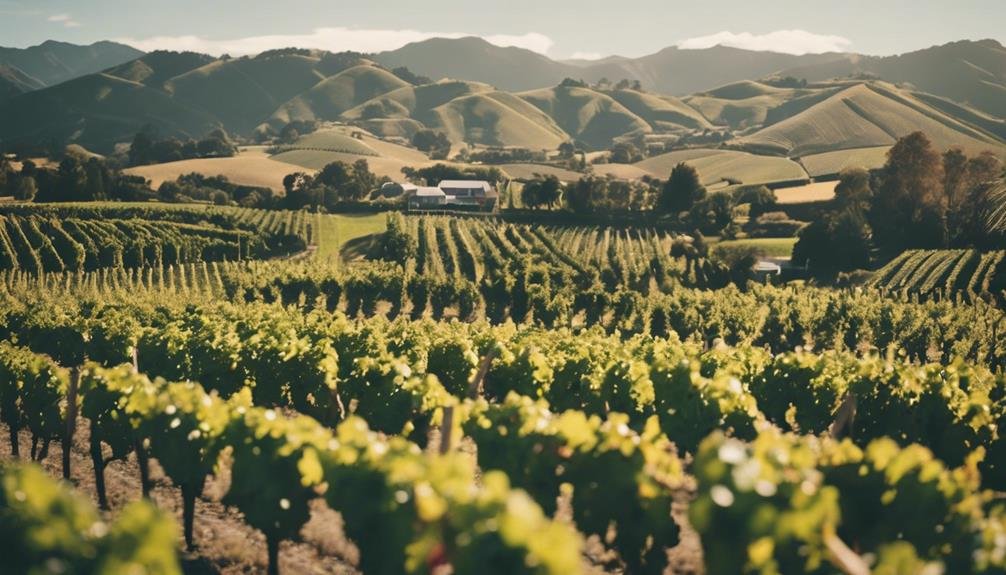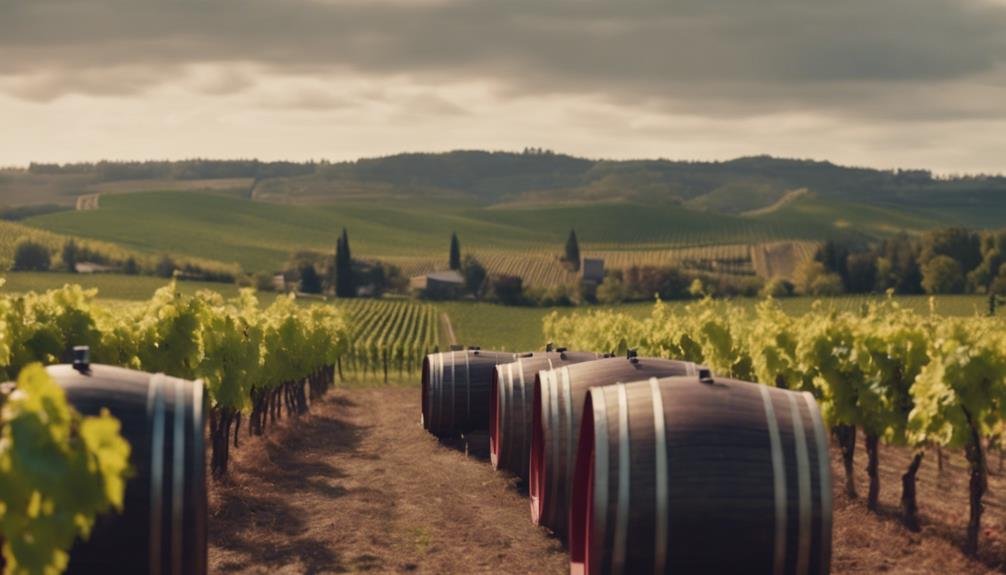Marlborough Pinot Noir is reshaping the wine landscape with its unique flavor profile. Influenced by minerality, it offers a blend of bright red fruits, floral notes, and earthy undertones. The diverse terroir of Marlborough contributes to distinct characteristics, with varying soil types and a maritime climate allowing for slow ripening. Sub-regions like Wairau Valley, Southern Valleys, and Awatere Valley each offer a different style of Pinot Noir. With global recognition and demand on the rise, Marlborough's Pinot Noir stands out for its diversity in flavor profiles and innovative production techniques, setting a new standard in the industry.
Unique Flavor Profile of Marlborough Pinot Noir
Marlborough Pinot Noir exudes an unparalleled symphony of aromas and flavors, embodying the essence of elegance and complexity in cool-climate wine production.
The minerality influence in Marlborough Pinot Noir adds a distinctive crispness and depth to the wine, reflecting the region's unique terroir.
This minerality, coupled with the aromatic complexity of bright red fruits, floral notes, and earthy undertones, creates a harmonious blend of flavors that captivate the senses.
The interplay between these elements results in a wine that is both refined and multifaceted, showcasing the mastery of winemaking in Marlborough.
The balanced fusion of minerality and aromatic complexity sets Marlborough Pinot Noir apart, establishing it as a standout expression of the grape variety in the global wine landscape.
Terroir Impact on Pinot Expression
The diverse terroir of Marlborough plays an important role in shaping the expression of Pinot Noir wines produced in the region. The soil composition and climate influence contribute greatly to the distinct characteristics found in Marlborough Pinot Noir.
The varying soil types, such as gravelly riverbed soils in the Wairau Valley, heavy clay soils in the Southern Valleys, and alluvial gravels in the Awatere Valley, impart unique flavors and textures to the grapes.
Additionally, Marlborough's maritime climate with warm days and cool nights allows for grapes to ripen slowly, leading to concentrated flavors and maintained acidity in the wines. These terroir factors combine to create a wide range of wine styles within Marlborough, showcasing the region's versatility and potential for producing high-quality Pinot Noir.
Sub-Regions Influence on Wine Styles

The diverse sub-regions within Marlborough exert a significant influence on the variety and complexity of wine styles found in the region. Soil diversity plays an essential role in shaping the flavors and characteristics of Marlborough wines.
For instance, the old, gravelly riverbed soils in the Wairau Valley produce light, bright, aromatic Pinot Noir, while the heavy clay soils in the Southern Valleys result in fleshy, round, and spicy Pinots. Additionally, microclimate effects further contribute to the uniqueness of wines from different sub-regions.
The cooler, windier climate of the Awatere Valley yields lean, vibrant, and perfumed Pinots. Understanding these soil and microclimate variations allows winemakers to craft a diverse range of wine styles that showcase the terroir of Marlborough.
Marlboroughs Pinot Noir Dominance
With a surge in global recognition and demand, Marlborough's Pinot Noir has firmly established itself as a standout player in the international wine market. The market growth for Marlborough Pinot Noir has been remarkable, with increasing popularity among wine enthusiasts worldwide.
Climate variation in Marlborough plays a pivotal role in shaping the unique characteristics of their Pinot Noir, offering a diverse range of styles to suit different preferences. The region's climate variation allows for the production of Pinot Noirs that exhibit a spectrum of flavors, from vibrant and fruity to more complex and spicy profiles.
This diversity in flavor profiles has contributed to Marlborough's dominance in the Pinot Noir market, making it a sought-after choice for wine connoisseurs looking for quality and innovation.
Innovations in Pinot Noir Production

As advancements in winemaking technology continue to evolve, the world of Pinot Noir production in Marlborough is experiencing a surge of innovative practices. Winemakers are implementing cutting-edge techniques to enhance the quality and sustainability of their Pinot Noir. Innovative methods such as precision viticulture, where vineyard management is tailored to specific microclimates, are being utilized to optimize grape quality.
Additionally, sustainability practices like organic and biodynamic farming are gaining traction to secure the long-term health of the vineyards. These techniques not only improve the environmental impact of winemaking but also contribute to the unique terroir expression in Marlborough's Pinot Noir.
Consumer Trends in Wine Market
Evolving consumer preferences continue to shape the dynamic landscape of the wine market. With a growing emphasis on sustainability practices, consumers are increasingly seeking wines produced using eco-friendly methods. This trend has led to an upsurge in vineyards implementing organic and biodynamic farming techniques, appealing to environmentally-conscious buyers. Additionally, packaging trends play an essential role in consumer choices, with a rising demand for eco-conscious and innovative packaging solutions. Wineries are responding by exploring alternative packaging such as cans, boxes, and lightweight glass bottles to reduce their environmental footprint. Embracing these consumer-driven changes in sustainability practices and packaging trends is essential for wineries looking to stay relevant and cater to the evolving market demands.
| Sustainability Practices | Packaging Trends | Consumer Preferences |
|---|---|---|
| Organic farming methods | Eco-friendly packaging | Environmentally-conscious |
| Biodynamic practices | Innovative packaging solutions | Sustainable choices |
| Reduced chemical usage | Alternative packaging materials | Preference for eco-conscious options |
| Biodiversity conservation | Lightweight glass bottles | Demand for convenient packaging |
| Energy-efficient operations | Cans and boxes | Emphasis on recyclability |
Future Collaborations and Expansion

In the domain of wine industry advancements, strategic collaborations and expansion initiatives are becoming pivotal for the growth and innovation of winemaking practices. Global partnerships play an essential role in sharing expertise and resources, leading to the development of new techniques and approaches.
Sustainability initiatives are gaining momentum, with wineries focusing on eco-friendly practices to combat climate change and guarantee the longevity of vineyards. Climate change poses challenges, driving the need for adaptation strategies and resilient vineyard management practices.
Vineyard expansion is on the horizon as wineries seek to meet growing demand and explore new terroirs. By fostering collaborations and embracing sustainable practices, the wine industry is poised for dynamic growth and resilience in the face of evolving market trends and environmental challenges.
Frequently Asked Questions
How Do Climate Change and Sustainability Practices Affect Marlborough Pinot Noir Production?
Climate change impacts Marlborough Pinot Noir production by altering growing conditions. Sustainability practices mitigate these effects, ensuring vineyard longevity. Adaptations such as water conservation, organic farming, and carbon footprint reduction are essential for maintaining quality and consistency in wine production.
What Role Do Indigenous Yeast Strains Play in Marlborough Pinot Noir Fermentation?
Indigenous yeast strains in Marlborough Pinot Noir fermentation enhance complexity, imparting unique flavor profiles. Their role extends beyond mere fermentation, shaping microbial diversity, and ultimately, the wine's character. Understanding their influence is pivotal.
How Are Aging Techniques Like Oak Barrels Evolving in Marlborough Pinot Noir Production?
In Marlborough, aging techniques in Pinot Noir production are evolving with an emphasis on barrel alternatives and fermentation innovations. Winemakers are exploring new oak substitutes to impart desired flavors and experimenting with advanced fermentation methods for enhanced complexity.
Are Biodynamic and Organic Farming Methods Gaining Traction in Marlborough Vineyards?
Organic farming methods and biodynamic practices are gaining traction in Marlborough vineyards. With a notable 30% increase in adoption over the past five years, these sustainable approaches prioritize soil health, biodiversity, and grape quality.
How Does the Rise of Natural Winemaking Impact Marlborough Pinot Noir Quality and Style?
The rise of natural winemaking in Marlborough impacts Pinot Noir by influencing flavor profiles, consumer preferences, and vineyard techniques. Sustainability practices, indigenous yeast strains, and oak barrel aging methods contribute to a shift towards more complex and environmentally conscious wines.
Conclusion
To sum up, Marlborough Pinot Noir has solidified its place in the global wine market through its unique flavor profile, terroir impact, and innovative production techniques.
While some may argue that traditional wine regions hold more prestige, the growing recognition and success of Marlborough's Pinot Noir challenge these perceptions.
As the region continues to push boundaries and shape the future of fine wine production, it is clear that Marlborough's Pinot Noir is here to stay.